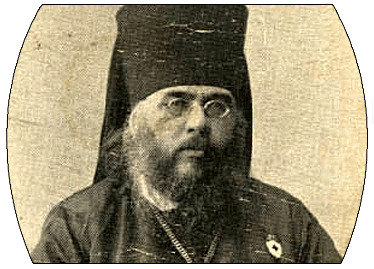Mikhail Zakharovich Ziorov was born on May 21, 1851 in Novomirgorod in the Kherson province of Russia to the family of an archpriest. After completing seminary studies in Odessa, he graduated from the Moscow Theological Academy in 1875. Upon graduation, he was assigned on October 10, 1875 to teach at the Ryazan seminary. He was named acting inspector (dean of students) of the Vologda Seminary on September 30, 1883, followed some two years later by his appointment as inspector of the Mogilev Seminary on November 8, 1885. After his monastic tonsure on September 25, 1887 and ordinations to the diaconate on September 27, 1887 and to the priesthood on October 1, 1887, he was appointed rector of the Mogilev Seminary on November 16, 1887 and elevated to the rank of archimandrite just days later on November 22, 1887. He was transferred to the rectorship of the Tiflis (Tbilisi, Georgia) Seminary on May 30, 1889. He was consecrated Bishop of the Aleutians and Alaska on September 29, 1891. After seven years of missionary labors in America, he was appointed Bishop of Tavrida and Simferopol on September 14, 1898. He was raised to the rank of Archbishop on March 26, 1905 and simultaneously transferred to the see of Tver and Kashin, but due to illness, he was unable to undertake this appointment and took up residence at a monastery in the Tavrida Diocese. In 1906, he was elected a member of the State Council (upper legislative body of the Russian Empire) as a representative of the monastic clergy. On April 5, 1908, he returned to active archpastoral service and was appointed Archbishop of Warsaw and Privislin. In 1912, he was reelected to the State Council, representing both monastic and married clergy. He reposed in the Lord in Petrograd (Russia’s capital city), on December 20, 1915.
A multi-talented and highly educated hierarch, Archbishop Nicholas was known as a gifted orator and writer. As hierarch of North America, he was instrumental in selecting and transferring exceptional clergy to serve in his diocese. Among those whose missionary labors have had a lasting legacy are Saints Raphael (Hawaweeny), Alexander Hotovitzky and John Kochurov. It was during the archpastorate of Bishop Nicholas, that mass immigration and Uniate conversions under the leadership of Saint Alexis Toth resulted in the establishment of parishes throughout the continental US. He traveled tirelessly providing archpastoral direction and support to the nascent communities and brotherhoods within them, which led to the establishment of a mutual aid society to network the brotherhoods. A parochial school established in Minneapolis in the 1890s soon grew into a missionary school and was transformed into a seminary in 1905 by Saint Tikhon, who succeeded Bishop Nicholas as ruling hierarch in America. Bishop Nicholas also directed the establishment of a diocesan periodical “Amerikansky Pravoslavny Vestnik” (American Orthodox Messenger) with Father Hotovitzky as editor for the first 18 years of publication. Even today, it remains a most valuable historical resource, providing both a systematic chronicle of diocesan activity and remarkable insights into the very pulse of Church life.
Although increasingly occupied with shepherding his flock in the lower 48 states, Bishop Nicholas did not neglect his Alaskan flock, but rather made two extensive archpastoral tours throughout Alaska during his episcopal tenure in North America. New parishes, schools and orphanages were established there under his archpastoral direction and supervision. Likewise, Bishop Nicholas encouraged the adaptation of educational curricula in Alaska to the new conditions as an American territory and provided liturgical books and spiritual literature for his flock both in Church Slavonic and Russian as well as in the native languages of the Alaskan peoples.
He was by far the most active Orthodox bishop in America before the Russian Revolution in his interaction with government officials and the US president. He staunchly defended his flock from the abuses of government officials and the proselytism of non-Orthodox missionaries, insisting that his flock had the right to maintain their Orthodox beliefs and customs and that a non-denominationalist policy should be maintained in public schools.
In October 1894, Bishop Nicholas attended a meeting of the Cabinet of the United States and the following day, October 27, he was received by President Grover Cleveland during the latter’s second term. The Federal Government had already investigated the complaints of the Russian bishop, finding abuses by government officials. Both the Cabinet and the President assured the bishop that they would endeavor to improve conditions for his flock in Alaska.
After the election of President William McKinley, Bishop Nicholas met with him and with Secretary of State John Sherman on October 23, 1897. Bishop Nicholas outlined the conditions under which his clergy served and the situation of the Orthodox population, as well as the attitudes of local officials and the Alaska Commercial Company toward the Church. Following this meeting, the government issued regulations mandating respect for the rights of the Orthodox in Alaska. However, these regulations remained unimplemented and the situation of the Orthodox remained unchanged. As he left America in 1898, Bishop Nicholas sent a stern letter to President McKinley concerning the continuing difficulties for his Alaskan flock and the deleterious activities of Sheldon Jackson, a Presbyterian minister, who was the General Agent of Education in the Alaska Territory. This letter was published in newspapers across America and drew a sharp response from Jackson, harshly critical of the persisting Orthodox influence in Alaska.
In many ways, the archpastoral labors of Bishop Nicholas laid the foundation for the missionary vision implemented by his successor, Saint Tikhon. In a poignant moment in December 1898, Bishop Nicholas greeted his successor as he arrived at the cathedral in San Francisco and presented him with an archpastoral staff passed down from Saint Innocent (Veniaminov), the first ruling hierarch to reside in North America, exhorting him to carry out his ministry as fruitfully as their great and noble missionary predecessor.

